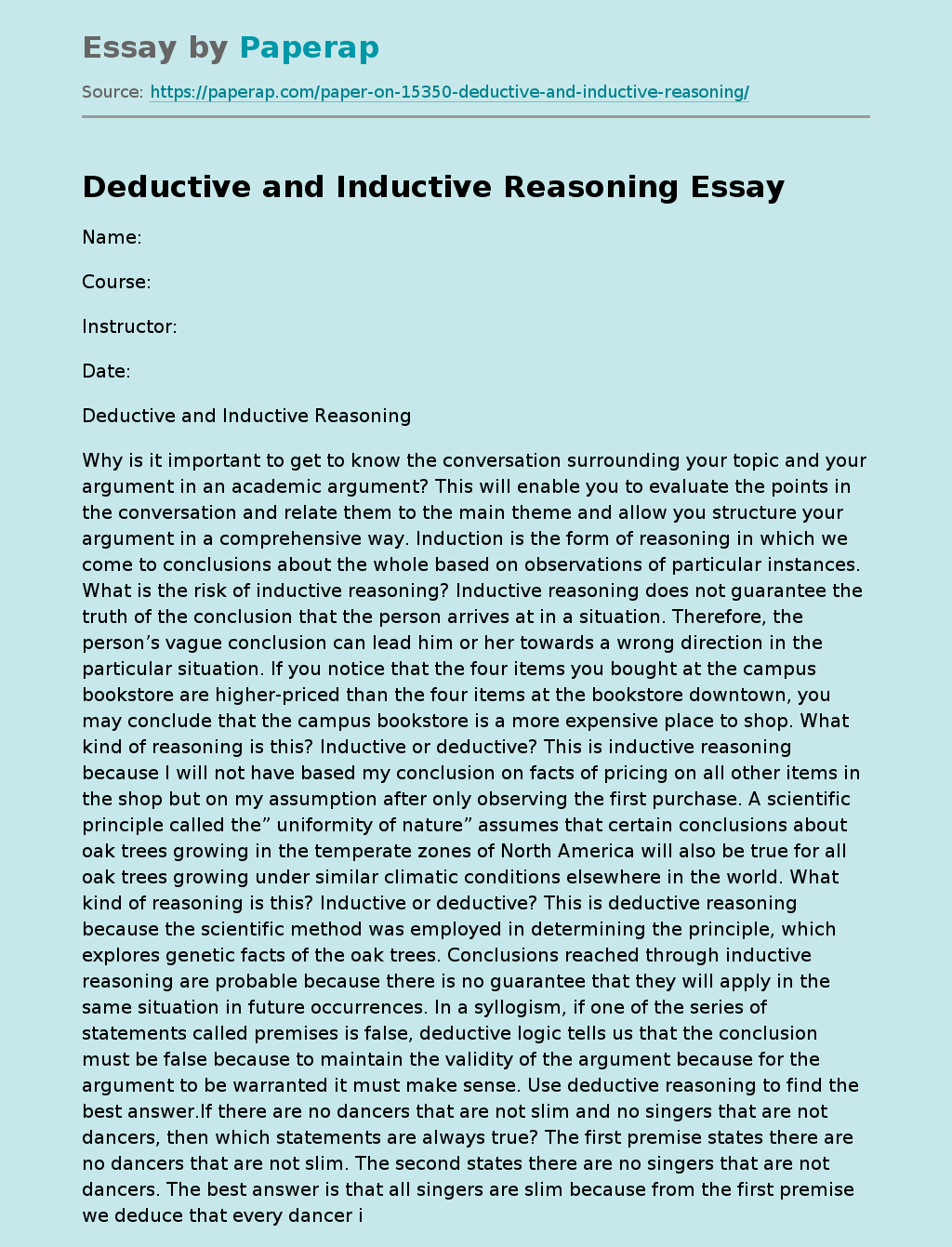Deductive and Inductive Reasoning
Name:
Course:
Instructor:
Date:
Deductive and Inductive Reasoning
Why is it important to get to know the conversation surrounding your topic and your argument in an academic argument? This will enable you to evaluate the points in the conversation and relate them to the main theme and allow you structure your argument in a comprehensive way. Induction is the form of reasoning in which we come to conclusions about the whole based on observations of particular instances. What is the risk of inductive reasoning? Inductive reasoning does not guarantee the truth of the conclusion that the person arrives at in a situation.
Therefore, the person’s vague conclusion can lead him or her towards a wrong direction in the particular situation. If you notice that the four items you bought at the campus bookstore are higher-priced than the four items at the bookstore downtown, you may conclude that the campus bookstore is a more expensive place to shop. What kind of reasoning is this? Inductive or deductive? This is inductive reasoning because I will not have based my conclusion on facts of pricing on all other items in the shop but on my assumption after only observing the first purchase.
A scientific principle called the” uniformity of nature” assumes that certain conclusions about oak trees growing in the temperate zones of North America will also be true for all oak trees growing under similar climatic conditions elsewhere in the world. What kind of reasoning is this? Inductive or deductive? This is deductive reasoning because the scientific method was employed in determining the principle, which explores genetic facts of the oak trees.
Conclusions reached through inductive reasoning are probable because there is no guarantee that they will apply in the same situation in future occurrences. In a syllogism, if one of the series of statements called premises is false, deductive logic tells us that the conclusion must be false because to maintain the validity of the argument because for the argument to be warranted it must make sense. Use deductive reasoning to find the best answer.If there are no dancers that are not slim and no singers that are not dancers, then which statements are always true? The first premise states there are no dancers that are not slim. The second states there are no singers that are not dancers. The best answer is that all singers are slim because from the first premise we deduce that every dancer is slim and the second premise suggests that every singer is a dancer. Use deductive reasoning to choose the best answer.This is data supplied by the cabbage growers union report for 2007: 80% of cabbages collected were heavy (over 0.5 kg), 10% of cabbages were green, 60% were red and 50% were big (having a diameter of over 10 cm). Which of the following statements must be false? a) All red cabbages were not big. b) 30% of the red cabbages were big c) There were no cabbages that were both green and big d) half of the cabbages were small. The false statement is that 30% of the red cabbages were big this conclusion does not relate with the premises of red and big cabbages. The percentage is wrong and invalid. Use a 3-part syllogism to answer this. Change the following invalid conclusion to make it valid. You have to be 16 years old to get a driver’s license. Abby will be 16 years old tomorrow. Therefore, Abby can now buy a car. For the conclusion to be valid, it must be true just as the premises. Therefore, in the scenario the first premise is that you have to be 16 years old to get a driver’s license. The second is Abby will be 16 years old tomorrow. The idea of buying a car does not relate to the premises. Thus, the correct conclusion is Abby will get a driver’s license tomorrow. Answer the following in one sentence.A warrant is an underlying value or assumption that often goes unstated in an argument. It is important to be aware of the warrant because the opposing position can object to and argue against the warrant. What is the warrant in the following claim? The first four years of college education should be provided free to all American citizens who are able. There will be many able Americans in colleges in the first four years of college education since it will be free. Write a paragraph that explains the similarities and differences between the three forms or structures of argument: Classical, Toulmin and Rogerian. Rogerian argumentation entails the pacified rapport between the writer or speaker and audience. It does not involve strict logic or logos but employs the characteristics of pathos and logos where the speaker or writer negotiates with the audience and respect their contrary views. Toulmin argumentation involves practical instances, which justify the developed ideas, and it requires data, claims, warrants, backing, rebuttal and qualifiers for the justification. An argument can be analyzed effectively with Toulmin argumentation. Classical argumentation refers to a rhetoric that captures and hooks the mood of the audience through an introduction, confirmation, concession, refutation and conclusion for effective persuasion. All three are similar in that they work in communicating a unique idea to the audience. Classical and Toulmin argumentation employ logos in terms of facts and data while Rogerian deals with pathos and ethos in terms of empathic listening. Unlike the other types, classical argumentation has an introduction and conclusion.
Deductive and Inductive Reasoning. (2018, Jul 16). Retrieved from https://paperap.com/paper-on-15350-deductive-and-inductive-reasoning/

